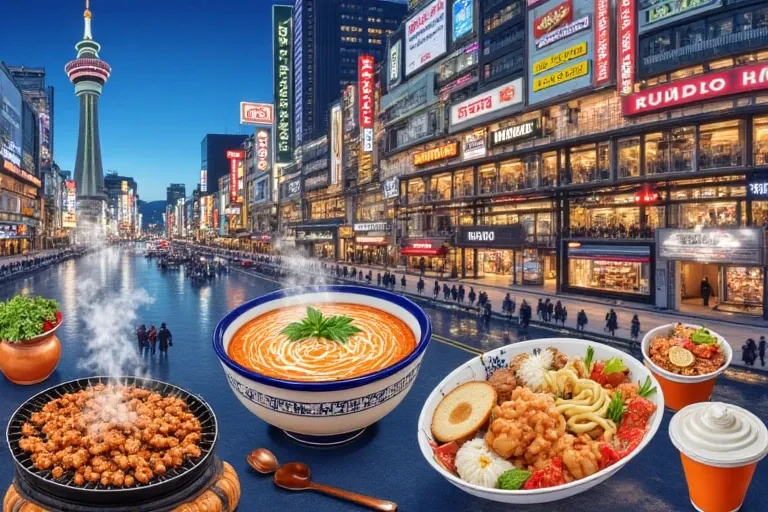Hey everyone, Mark here! I've just returned from an incredible trip to Hokkaido, Japan, and I'm bursting to share my experiences. This trip was far more than just sightseeing; it was a deep dive into Hokkaido's culture, history, and of course, its unbelievably delicious food! If you're planning a trip to Asia and are looking for an off-the-beaten-path adventure with a unique blend of modernity and tradition, Hokkaido should be at the top of your list. Get ready to be amazed!
Sapporo Station: The Gateway to Hokkaido
My adventure began in Sapporo, Hokkaido's vibrant capital. The first thing that struck me was the Sapporo Station. It’s more than just a train station; it's a bustling hub connecting the city to New Chitose Airport and the rest of Japan. I even saw evidence of a famous Japanese celebrity here – Crayon Shin-chan! Talk about a fun surprise.
The station is incredibly well-connected, making it the perfect starting point for exploring the region. Whether you're arriving by plane from New Chitose Airport or by train from another part of Japan, Sapporo Station is your gateway to all the amazing things Hokkaido has to offer.
Sapporo's Iconic TV Tower and the Magic of Miso Ramen
Standing tall against the Hokkaido sky, Sapporo TV Tower is a must-see. It reminded me a bit of Tokyo Tower – and for good reason, as both were designed by the same architect! This iconic landmark offers stunning views of the city.
Let’s talk about food. Hokkaido is famous for its ramen, and Sapporo's miso ramen is a legend in its own right. I learned that before the 1950s, Sapporo ramen was primarily soy sauce based. But then, a chef at a small restaurant called Ajino Sanpei, named Omiya Morito, was inspired by a foreign TV program highlighting the health benefits and deliciousness of miso. The rest, as they say, is history! Miso ramen was born, and now Sapporo boasts hundreds of restaurants serving this creamy, savory delight.
A Taste of History: Fourth-Generation Ramen and Tanukikoji Shopping Street
I had the pleasure of dining at a ramen restaurant proudly proclaiming itself "Fourth Generation." This wasn't just a restaurant; it was a living piece of Sapporo's culinary heritage. The experience was amazing, from the cozy atmosphere to the perfectly cooked noodles. They use machine-made noodles from a brand called Senzhu Noodles, often labelled as "Sapporo Fresh Noodles."
From there, I ventured into Tanukikoji Shopping Street, a vibrant commercial area with a fascinating history. The name itself, meaning "badger dog lane," originates from the raccoon dogs that once frequented the area. This bustling street is a shopper's paradise, offering everything from clothing and shoes to arcades and cosmetics, and of course, plenty of delicious food. I even found a lucky raccoon statue – touching its different parts is said to bring good fortune!
Sapporo's Nightlife and the "Free Information Centers"
Sapporo's nightlife is as vibrant as its daytime attractions. Susukino, one of Japan’s three major entertainment districts, pulses with energy. While it's known for its "host and hostess" clubs, don't let that deter you. The clubs across from the main street act as "free information centers" – a euphemism for matchmaking services. They might seem like free services, but remember, they often take commission from the subsequent expenses you might incur.
Genghis Khan BBQ: A Hokkaido Staple
My culinary journey continued with Genghis Khan BBQ, a Hokkaido specialty. Don't let the name fool you; it’s a uniquely Japanese dish, not Mongolian! The distinctive dome-shaped grill, resembling a soldier's helmet, adds to the experience. The juicy mutton, expertly grilled, was simply phenomenal. I paired it with a refreshing Sapporo beer – the perfect combination! The story goes that the style was invented by Genghis Khan himself.
Exploring Sapporo's History and Culture
Sapporo's history is rich and captivating. I visited the former Hokkaido Government Office Building, a stunning red-brick structure. The area was once known as Ezo, home to the Ainu people – an indigenous group with a unique culture and history.
I also explored the Sapporo Agricultural College, now part of Hokkaido University, marveling at its beautiful architecture. The clock tower on campus is the oldest clock tower in Japan.
Finally, I visited Hokkaido University's central cafeteria, a great place to experience a taste of student life and local cuisine. The menu was impressive, and the prices were very reasonable. I opted for the tonkatsu (breaded pork cutlet) with rice.
White Lover Park: A Sweet End to the Journey
My Hokkaido adventure ended on a sweet note at White Lover Park, a factory and theme park dedicated to the iconic White Lover cookies. This is a great place to learn about the cookie's history, and even try your hand at making your own! There's also a delightful selection of other sweets and chocolates to enjoy.
Hokkaido: A Culinary and Cultural Paradise
Hokkaido is a region that has truly captured my heart. From its vibrant cities to its stunning natural landscapes, from its rich history to its amazing cuisine, Hokkaido offers something for every traveler. It's a destination that deserves more than just a quick visit; it's a place to immerse yourself in, to savor, and to remember long after you've left. So, if you're looking for an unforgettable Asian adventure, pack your bags and head to Hokkaido! You won't regret it.
Food Summary Table
| Dish | Description | Notes |
|---|---|---|
| Miso Ramen | Sapporo's signature ramen, rich and creamy miso broth. | Hundreds of restaurants serve variations. |
| Genghis Khan BBQ | Mutton grilled on a dome-shaped grill. | A Hokkaido specialty, uniquely Japanese. |
| Soup Curry | Curry served in a flavorful broth, often with chicken, seafood, or vegetables. | A Sapporo specialty, customizable spiciness levels. |
| Hokkaido University Lunch | Wide variety of affordable and delicious meals at the university cafeteria. | Offers a taste of authentic Japanese student life, certain times are off-limits to tourists |
| White Lover Cookies | Iconic Hokkaido cookies with a delightful chocolate filling. | Many variations and limited editions available. |







